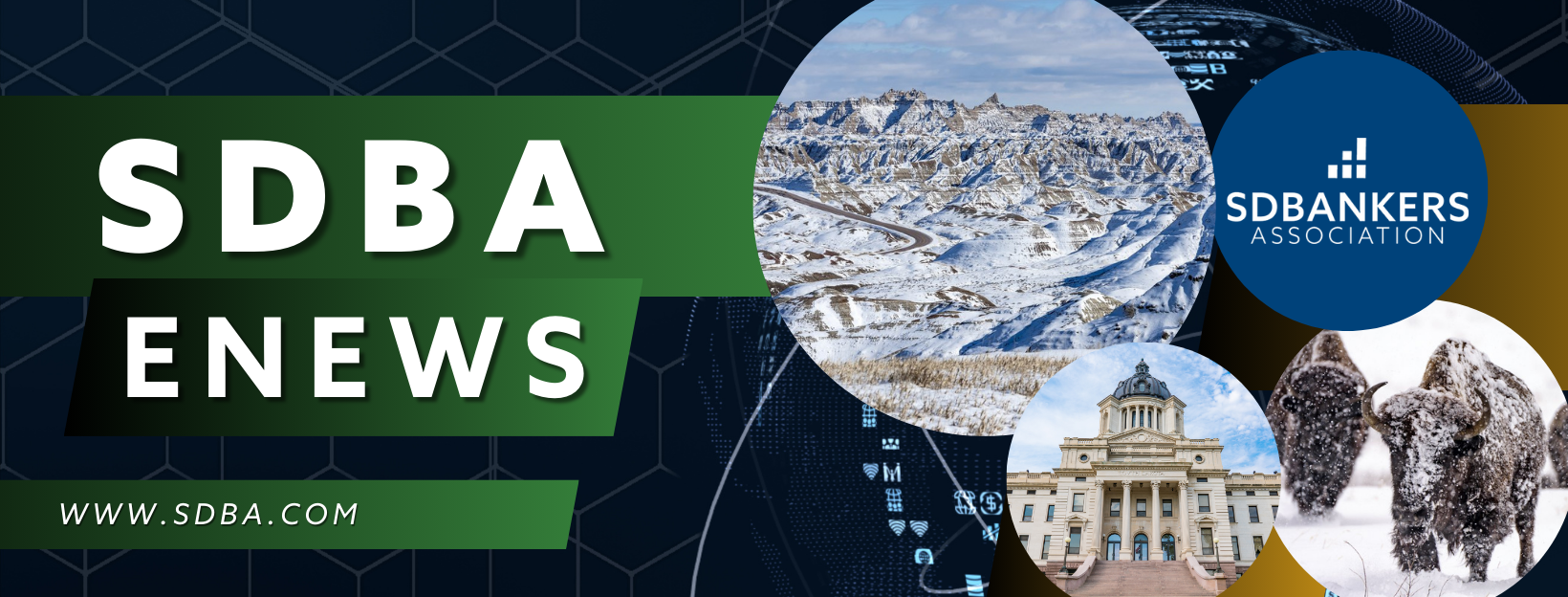- Education & Events
- Advocacy
- Products & Services
- Membership
- Resources
- SDBANKER Magazine
- SDBA eNews
- SDBA eNews Archives
- Legislative Update/Bill Watch
- South Dakota Bank Directory
- Women in Banking
- Scenes of South Dakota Calendar*
- Holiday Signs
- Regulatory Report
- South Dakota Banking Code
- Record Retention Manual
- Advertising & Sponsorship Guide
- COVID-19 Resources
- Mental Health and Crisis Prevention
- About
|
News
SDBA UpdatesSDBA Events
Online EducationABA Banking Journal: ABA urges OCC to provide stronger safeguards, clearer rules for charter applicantsFebruary 11, 2026
The OCC in January proposed to amend its chartering regulations to clarify that national banks are not limited to performing fiduciary activities. In a letter to the agency, ABA emphasized that the OCC must “ensure that robust, broadly applicable safety and soundness standards are well understood and upheld during this period of rapid innovation” and encouraged the agency to increase transparency throughout the chartering process. ABA noted that the responsibilities of many recent and likely future charter applicants “are not readily identifiable today because Congress and federal and state regulators have not yet adequately defined regulatory frameworks applicable to entities engaged in stablecoin and other digital asset activities.” The association asserted that the proposed amendment to the chartering regulation is material and merits continued deliberation given its “likely outsized role in the development and implementation of a number of other agencies’ pending rulemakings.” The letter also highlighted the need for strong safeguards around resolution planning. ABA “strongly encouraged the OCC to ensure that its receivership capacities and related powers and practices are adequate to address any insolvency risks raised by any existing or new OCC charter applicant,” particularly those experimenting with new business lines and unfamiliar operational risks. As part of its recommendations, ABA stressed the importance of name accuracy for chartered entities to avoid misleading consumers. The association encouraged “OCC to amend its regulations to prohibit any charter applicant – other than a subsidiary of a bank or bank holding company – that limits its activities to either ‘fiduciary activities’ or ‘the operations of a trust company and activities related thereto’ from including the word ‘bank’ in its name.” ABA said that this step would help ensure entities “not have a title that misrepresents the nature of the institution or the services it offers.” Back to TopABA Banking Journal: Democrats urge courts to stop efforts to ‘dismantle’ CFPBFebruary 10, 2026
CFPB Acting Director Russell Vought has laid off most of the bureau staff, closed bureau offices and declined to request funding for the agency from the Federal Reserve. His actions have been challenged in federal court by the union representing CFPB employees and by Democratic state attorneys general. Separate courts have paused the layoffs and directed the Trump administration to continue funding the agency, although the lawsuits are still ongoing. In an amicus brief filed ahead of a U.S. Court of Appeals for the D.C. Circuit hearing later this month, the lawmakers argue that the Trump administration’s actions are unconstitutional because only Congress has the authority to create and abolish government agencies. “Because the power to abolish executive branch agencies belongs to Congress, [administration officials] cannot unilaterally shutter the CFPB nor render it incapable of fulfilling its statutory obligations,” they said. “Allowing them to do so would not only irreparably harm America’s consumers and the national economy but also wreak havoc on our constitutional separation of powers.” In conjunction with the court filing, the Democratic minority on the Senate Banking Committee released a report alleging that the administration’s efforts to close the CFPB have cost Americans up to $19 billion over the past year. Full ArticleABA Banking Journal: FHFA finalizes repeal of fair lending ruleFebruary 10, 2026
Last year, FHFA proposed to repeal the Fair Lending, Fair Housing and Equitable Housing Finance Plans regulation, citing President Trump’s executive order directing federal agencies to repeal “unnecessary” regulations. The agency recently announced in the Federal Register that after taking public comment, it has adopted the repeal, which goes into effect on March 9. Among other things, the 2024 rule made changes to Fannie’s and Freddie’s Equitable Housing Finance Plans to promote greater accountability; added oversight of unfair or deceptive acts or practices to FHFA’s fair housing and fair lending oversight programs; required additional certification of compliance by all the entities; and established more precise standards related to fair housing, fair lending and equitable housing principles for the entities’ boards. It also created a new requirement for FHLBs to annually report on any actions they voluntarily take to address barriers to sustainable housing opportunities for underserved communities. In its repeal, FHFA said that while the Equitable Housing Finance Plans outlined in the 2024 rule may offer a broader reach than the existing affordable housing goals and Duty to Serve programs, the latter two “are grounded in statute and subject to rigorous performance evaluation and enforcement mechanisms.” “As such, these programs are designed to address persistent disparities in access to mortgage credit and housing finance, including those affecting rural, manufactured housing and other underserved markets,” the agency said. “The programmatic structure provides a durable and enforceable framework for advancing access to the housing finance system.” Back to TopCISA News: The Iceberg EffectJanuary 28, 2026 | Halcyon
|


 As the Office of the Comptroller of the Currency considers revising its chartering rules, the agency should seek to uphold strong safety and soundness standards, increase transparency in the chartering process, and move cautiously as new regulatory frameworks develop, the American Bankers Association said today. ABA also called for updated naming rules to ensure charter applicants do not misrepresent the services they intend to offer.
As the Office of the Comptroller of the Currency considers revising its chartering rules, the agency should seek to uphold strong safety and soundness standards, increase transparency in the chartering process, and move cautiously as new regulatory frameworks develop, the American Bankers Association said today. ABA also called for updated naming rules to ensure charter applicants do not misrepresent the services they intend to offer. Nearly 200 Democratic and independent members of Congress this week
Nearly 200 Democratic and independent members of Congress this week 
 Why Ransomware Costs 10× More Than You Think
Why Ransomware Costs 10× More Than You Think


